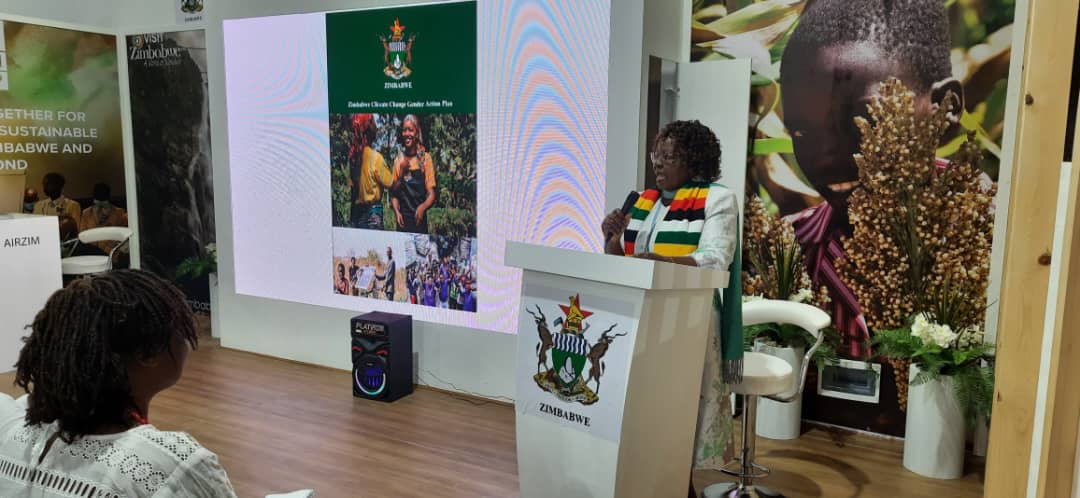|
Getting your Trinity Audio player ready...
|
During the ongoing COP27 in Sharm El Sheikh, Egypt yesterday, Zimbabwe launched the Climate Change Gender Action Plan as parties have recognized the importance of involving women and men equally in the United Nations Framework Conference on Climate Change (UNFCCC) processes.
Speaking during the launch, the Honourable Minister of Women Affairs, Community, Small and Medium Enterprises Development, Dr. Sithembiso Nyoni emphasised the need for mainstreaming gender and climate change in the Paris Agreement in line with the UNFCCC Gender Action Plan which was adopted at COP25.
Zimbabwe as a member country from 2020 to 2021, worked on coming up with its own Gender Action Plan which suits our Zimbabwean situation.
“Mainstreaming gender in Climate Change plays a huge role in the achievement of Sustainable Development Goals (SDGs) because of its inclusive nature. The mainstreaming of gender which the Government of Zimbabwe under the new dispensation is championing is one of the key enablers to steering the country toward the Vision 2030 trajectory of being a prosperous and empowered upper-middle-income society for its citizens by 2030.
“At this point in time, I would like to applaud the collaboration between my Ministry and the Ministry of Environment, Climate, Tourism and Hospitality Industry together with support from UNDP for working closely together in coming up with the Zimbabwe Gender Action Plan on Climate Change. A training manual was also developed in supporting the systematic mainstreaming of gender in Climate Change. The action plan seeks to support the country’s vision for 2030 towards a transformed, more effective, inclusive, resilient, and sustainable economy that leaves no one behind through addressing climate change vulnerabilities,” Hon Nyoni said.
Climate change and gender are both cross-cutting development issues that need to be mainstreamed across all sectors in order to build the resilience of communities to the effects of climate change and to promote sustainable socio-economic growth.
Mainstreaming gender in climate change interventions becomes imperative in strengthening communities’ resilience to climate change effects, and protecting livelihoods, particularly for women, youth, and groups in vulnerable situations especially people with disabilities and the elderly whose livelihoods heavily depend on the climate and the environment.
The United Nations Framework Convention on Climate Change (UNFCCC) at the Conference of Parties (COP) in 2019 adopted the Gender Action Plan (GAP) a significant milestone for the advancement of gender equality and women empowerment.
The GAP calls for inclusiveness as well as gender sensitive and responsive policies, programs and projects within all climate change elements of mitigation, adaptation, capacity building, technology transfer and finance. Nationally, the Zimbabwe Constitution of 2013 upholds gender equality as one of its principles. Gender mainstreaming has also been embedded in Government policy as a critical strategy for the promotion of gender equality and women empowerment across all sectors. The revised National Gender Policy of 2017 also has climate change as one of its thematic areas to which gender sensitive programming and inclusivity has to be fostered in order to attain inclusive sustainable development.
The Ministry of Environment, Climate, Tourism and Hospitality Industry and the Ministry of Women Affairs, Community, SMEs Development with technical and financial support from the United Nations Development Program (UNDP) Climate Promise supported the development of Zimbabwe Climate Change Gender Action Plan (ccGAP) and training manual that fed into the revised NDC.
The ccGAP ensures that gender aspects are factored into the NDC implementation processes leveraging on the analysis, strengthening institutional mechanisms and ensuring gender-responsive climate actions. A ccGAP is a very important aspect that offers an opportunity to promote inclusiveness and successful development outcomes. It is also expected that the NDCs implementation will serve as a driver for sustainable development at the national level and in contributing to the global Sustainable Development Goals (SDGs), including the integration of gender in NDC planning and implementation processes.






